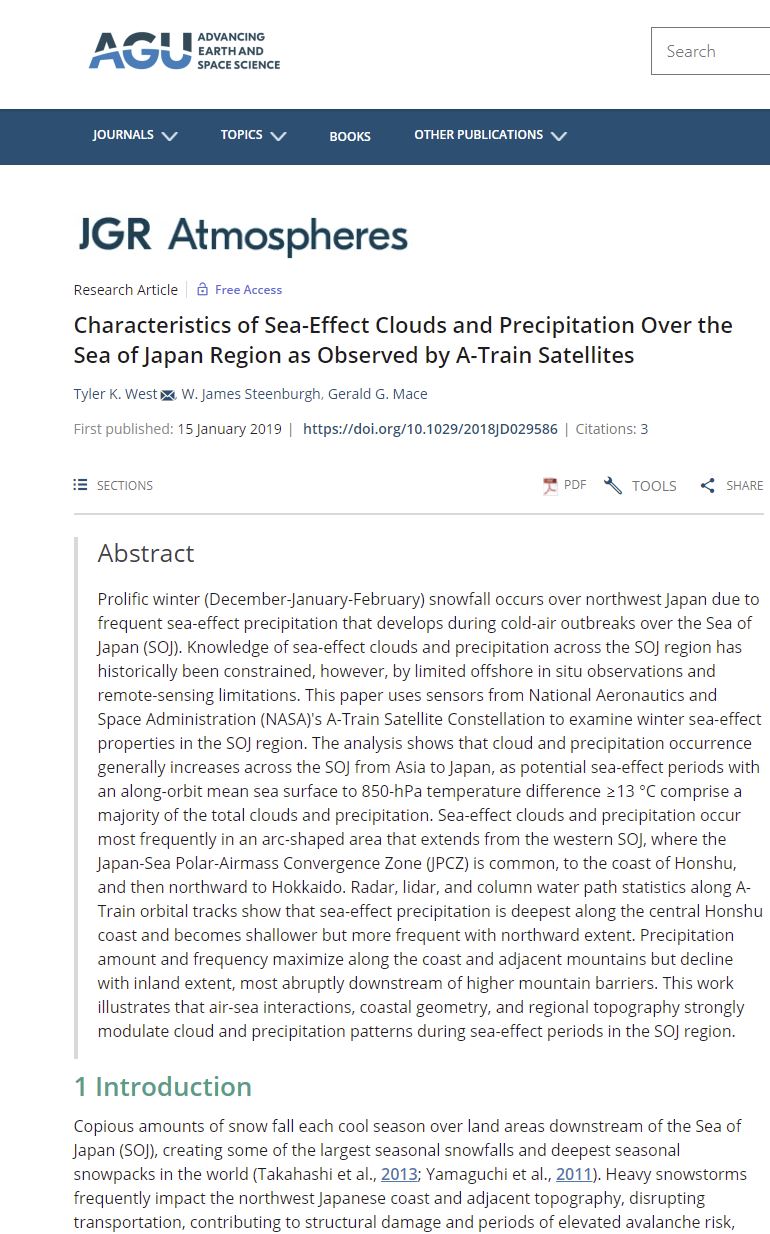 작성일 : 21-08-06 20:12
작성일 : 21-08-06 20:12
|
글쓴이 :
배화여고최영인
 조회 : 571
|
|
https://agupubs.onlinelibrary.wiley.com/doi/abs/10.1029/2018JD029586
|
 |
|
| 서한 |
시정서한 |
|
| 매체 |
웹사이트
|
|
| 이슈 |
|
|
| 언어 |
|
|
| 서한보내는곳 |
tyler.k.west@utah.edu |
|
| 오류내용 |
오류 내용 동해를 Sea of Japan 으로 표기함 |
|
| E-mail / Contact |
asianomadjr@gmail.com |
|
서론 |

To Mr. West:
I was
looking at the effects of global warming for a school paper and happened on
your article about the effects of the sea on cloud and precipitation over the EAST SEA: https://agupubs.onlinelibrary.wiley.com/doi/abs/10.1029/2018JD029586. I was deeply distressed
to find a research article had chosen to designate the East Seas as ‘Sea of
Japan.’ It seemed extremely inappropriate and frankly appalling, that a
research article written by a scientist like yourself would be so ill informed
to blatantly use such designation with complete lack of regard for the dispute
between the Korea and Japan. I believe that you should be better informed of the
political implications while researching for your research paper; it is frankly
offensive and greatly insensitive.
|
|
| 본론 |
Articulating the correct use
of the names for the body of water between Korea and Japan is not simply a
question of naming a geographic area but is part of a national effort by the
Korean Republic to erase the legacy of Japanese Imperialism and to redress the
unfairness that has been resulted from that period. The way
African-Americans were enslaved, so was the Korean people. Therefore, I urge
you to use 'East Sea' to describe the body of water in question or to use both
Korean and Japanese designation simultaneously (e.g. 'East Sea/Sea of Japan')
in your contents and maps.
Furthermore, for more than 2,000 years, not
just Koreans, but people throughout the world, viewed the body of water on the
eastern boundary of Asia between Korea and Japan as the East Sea. In order to
resolve the controversy, in 2019, the
International Hydrographic Organization (IHO) reportedly urged Japan to
negotiate with the Republic of Korea. The IHO was founded in 1921 to
standardize the names of seas and oceans and support safe navigation of ships.
The name the East Sea was on world maps, including old Japanese maps, until the
publication of S-23 “the Limits of Oceans and Seas” by IHO in 1929.
During the time when the IHO was creating a list of the names of oceans and
seas, Japan had occupied and imperialized Korea starting in 1910 and ending in
1945. Accordingly, Korea was unable to participate in the decision-making
process. As a result, only the name Sea of Japan was used in the
publication, which fueled the spread of the name on world maps and in
textbooks. This practice remained in the second (1937) and third edition (1953)
of the publication of S-23 “the Limits of Oceans and Seas” because Korea was
either under Japanese rule from 1910 to 1945 or engaged in a war from
1950-1953, the time of the publications. According
to IHO and UNCSGN, in case of topographical feature shared with two or more
countries, yet naming differently in their own languages, all the names in each
language should be marked. Once Korea and Japan agree on a common designation
that is in accord with the general rule of international cartography we will
then follow the agreed-on designation.
|
|
| 결론 |
Please repost a corrected
version of this research article as it is extremely inappropriate and frankly
appalling. Actually, the fact that American Geophysical Union allowed this and
had not made the correction was astounding and I plan to write to them as well
requesting that changes be made and that further articles are required to use
the correct name for the body of water in question. A scientist in an international
institution like University of Utah, should be sensitive to the plight of other countries.
Even as the world is ravaged by not only by Covid-19, but racial injustice and
discrimination, it is imperative that matters pertaining to international
guidelines be meet more rigorously. I ask that you contact me with changes and
look forward to visiting your site with the implemented change. You can email
me at asianomadjr@gmail.com with your response,
it would be greatly appreciated. Thank you. And I look forward to hearing from
you soon.
Sincerely,
Allison Cheigh |
|

